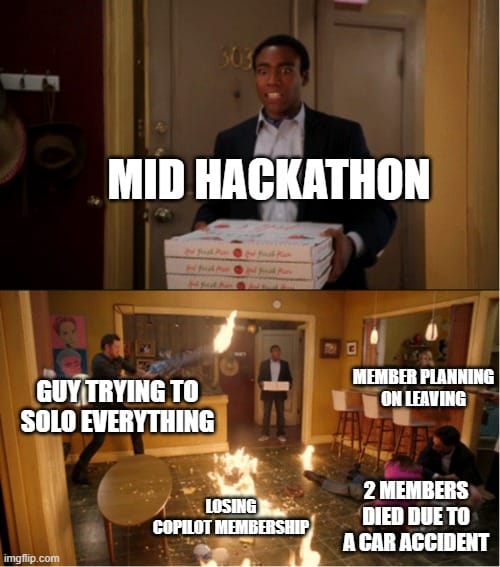- Jobless
- Posts
- How to Survive Your First Hackathon (and Actually Win Something)
How to Survive Your First Hackathon (and Actually Win Something)
The insider guide to not embarrassing yourself at 3 AM while coding
I registered for my first hackathon thinking I'd build the next Uber but for dogs.
24 hours later, I was debugging an app that somehow broke the internet. My team disbanded at hour 6, I survived on energy drinks and regret, and my final presentation was just me….. idk….yapping ig???
That's when I realized: I wasn't prepared for a hackathon. I was prepared for a self depriving coding disaster.
No strategy. No team. Just me, unrealistic expectations, and a laptop that decided to update Windows mid-competition.
If you've ever thought "hackathons look fun" but secretly worry you'll be the person asking "what's GitHub?" in front of 200 developers... you're not alone.
The real struggle isn't coding under pressure. It's knowing what the hell you're supposed to be doing in the first place.
But here's the thing—hackathons aren't just about coding. They're about problem-solving, teamwork, and building something that doesn't completely suck in 48 hours.

relatable enough?
Plot Twist: The Best Hackers Aren't Actually Hacking
Here's what nobody tells you: 65% of hackathon participants are undergraduates who have no idea what they're doing. The difference between winners and everyone else isn't coding skills—it's preparation and knowing how to play the game.
Most people show up thinking it's a coding competition. Wrong. It's a storytelling competition where you happen to build something.
🎯 The Actually-Win-Something Hackathon Framework
Here's what successful teams do (while everyone else panics):
Phase 1: Pre-Hackathon Prep
Research the theme and sponsors. If it's an AWS-sponsored event, your blockchain solution probably won't win. If it's healthcare-focused, build something that solves actual medical problems.
Set up your tech stack in advance:
VS Code with your favorite extensions
GitHub account (and know how to use it)
Firebase/Vercel accounts for quick deployment
Figma for mockups (even if you can't design)
Form your squad early. The best teams aren't random strangers—they're people who've worked together before and actually like each other.
Phase 2: The 48-Hour Sprint Strategy
Hour 1-2: Team formation and idea validation
Don't spend 6 hours debating ideas. Pick something simple that solves a real problem and move on.
Hour 3-6: Plan and divide
Assign clear roles: who's coding what, who's designing, who's presenting. Limit presenters to 2-3 people max.
Hour 7-40: Build the MVP
Focus on one core feature that works perfectly rather than ten features that barely function.
Hour 41-48: Demo prep and presentation practice
Winning teams spend 30% of their time on presentation. Your code doesn't matter if you can't explain it.
🏆 The Platforms That Actually Matter
For Beginners:
HackerEarth: Best for first-timers with comprehensive support and beginner-friendly competitions
Devpost: The GitHub of hackathons—most major events use this platform
MLH (Major League Hacking): Student-focused with excellent community and mentorship
For Specific Interests:
TAIKAI: Web3 and blockchain hackathons with token rewards
NASA Space Apps: Global event welcoming all skill levels (yes, even yours)
⚡So Here’s The Goal…
Before the Event:
Set realistic goals. Learning new tech > winning prizes (but winning is nice too).
Research the judges. What do they care about? Technical innovation? Business viability? Social impact?
During the Event:
Start with wireframes, not code. Spend 2 hours planning to save 10 hours debugging.
Hard-code data if needed. A working demo with fake data beats a broken app with real APIs.
Network like crazy. 15% of participants get job offers post-hackathon.
The Presentation:
Lead with the problem, not the solution
Show, don't tell. Live demos > slide decks
And Remember:
Solve a real problem (not "Uber for X")
Build something that works (even if it's simple)
Tell a compelling story (problem → solution → impact)
Demo like you mean it (practice your pitch 10 times)
OH btw... we put together a curated job board with roles that actually pay well and are open to negotiation worldwide. Check it out -[https://docs.google.com/spreadsheets/d/1wIwkxu6xNNTLroGrZ-UO8BXqVHr884HiV60Dy-qUEVg/edit?usp=sharing].
The Reality Check Section
Look, most hackathons are chaotic. You'll encounter bugs that make no sense, teammates who disappear, and judges who ask questions you didn't prepare for.
But here's the secret: everyone else is dealing with the same chaos:) The teams that win aren't the ones with perfect code—they're the ones who handle the chaos best and still deliver something that makes sense.
Plus, even if you don't win, you'll have:
A portfolio project to show employers
New connections in the tech community
Stories that make great interview talking points
Experience working under pressure (which is basically every tech job)
That’s it for this week.
Until then: Keep building, keep shipping, and remember—every expert was once a beginner who showed up anyway..💛
Team Jobless
P.S.
New here? Check our Referral Kit and enjoy high-worth job-cracking interview-nailing hackathon-excelling resources!